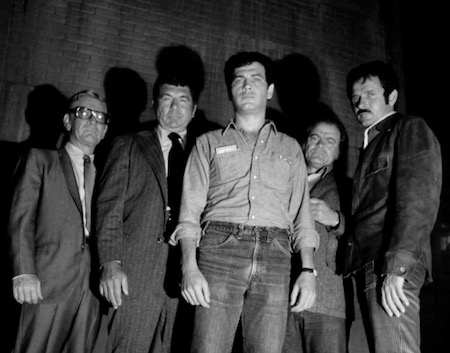Minor telefilm The Death Squad shouldn’t merit any attention—the story is so compressed that it feels as if pieces are missing, and the basic premise appeared in the previous year’s hit Dirty Harry movie Magnum Force. Yet good performances, especially Robert Forster’s emotionally committed turn in the leading role, make The Death Squad watchable. If nothing else, the picture provides a poignant reminder that something was lost when Forster’s career failed to gain momentum in his early years as a screen performer. While it’s true he was prone to robotic performances when saddled with sketchy material, moments in The Death Squad remind viewers what he could do when he tried. He’s more poignant here than the situation demands or deserves.
Forster plays Eric Benoit, a cop tasked with identifying rogue officers responsible for vigilante killings of crooks who got off on technicalities. Although this setup prompts a handful of chases and shootouts, the main focus of The Death Squad is Benoit wrestling with divided loyalties. How deep a rot will he discover in his department? What happens when he learns that a cop who screwed him over in the past is part of the vigilante group? Will digging into the origins of the vigilante group reveal secrets that hit Benoit even more personally? To their credit, the makers of The Death Squad raise all of these questions—and to their shame, the makers of The Death Squad provide satisfactory answers to only a few of those questions. This is the sort of malnourished narrative in which the nominal female lead, played by Michelle Phillips, could have been excised from the storyline and her absence wouldn’t have been felt.
Nonetheless, the stuff that works in The Death Squad is entertainingly melodramatic and pulpy. Claude Akins, who plays the heavy, provides a potent mixture of menace and swagger. Character actors including George Murdock, Dennis Patrick, Bert Remsen, and Kenneth Tobey lend color to small roles, while the great Melvyn Douglas classes up the joint by playing Benoit’s mentor in a few brief scenes. On the technical side, the picture benefits from unfussy camerawork and a rubbery jazz/funk score in the Lalo Schifrin mode (more shades of the Dirty Harry movies). Best of all, actors and filmmakers play the lurid material completely straight, so every so often a scene—usually involving Forster—provides a glimmer of the great Roger Corman drive-in thriller The Death Squad should have been. Ah, well. We’ll always have Akins.
Forster plays Eric Benoit, a cop tasked with identifying rogue officers responsible for vigilante killings of crooks who got off on technicalities. Although this setup prompts a handful of chases and shootouts, the main focus of The Death Squad is Benoit wrestling with divided loyalties. How deep a rot will he discover in his department? What happens when he learns that a cop who screwed him over in the past is part of the vigilante group? Will digging into the origins of the vigilante group reveal secrets that hit Benoit even more personally? To their credit, the makers of The Death Squad raise all of these questions—and to their shame, the makers of The Death Squad provide satisfactory answers to only a few of those questions. This is the sort of malnourished narrative in which the nominal female lead, played by Michelle Phillips, could have been excised from the storyline and her absence wouldn’t have been felt.
Nonetheless, the stuff that works in The Death Squad is entertainingly melodramatic and pulpy. Claude Akins, who plays the heavy, provides a potent mixture of menace and swagger. Character actors including George Murdock, Dennis Patrick, Bert Remsen, and Kenneth Tobey lend color to small roles, while the great Melvyn Douglas classes up the joint by playing Benoit’s mentor in a few brief scenes. On the technical side, the picture benefits from unfussy camerawork and a rubbery jazz/funk score in the Lalo Schifrin mode (more shades of the Dirty Harry movies). Best of all, actors and filmmakers play the lurid material completely straight, so every so often a scene—usually involving Forster—provides a glimmer of the great Roger Corman drive-in thriller The Death Squad should have been. Ah, well. We’ll always have Akins.
The Death Squad: FUNKY





